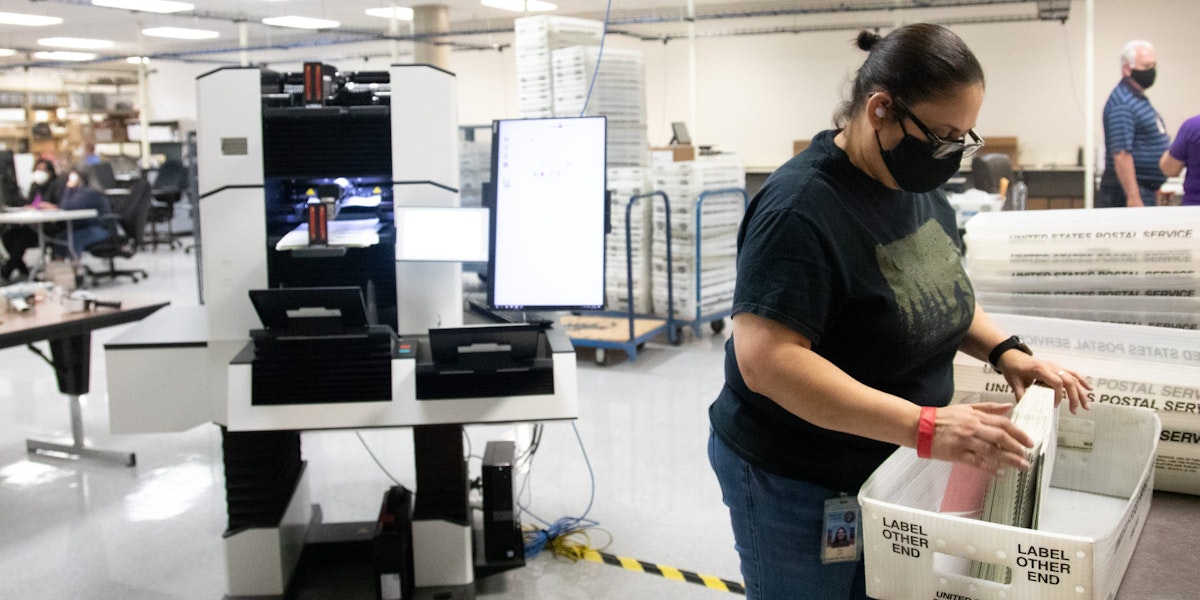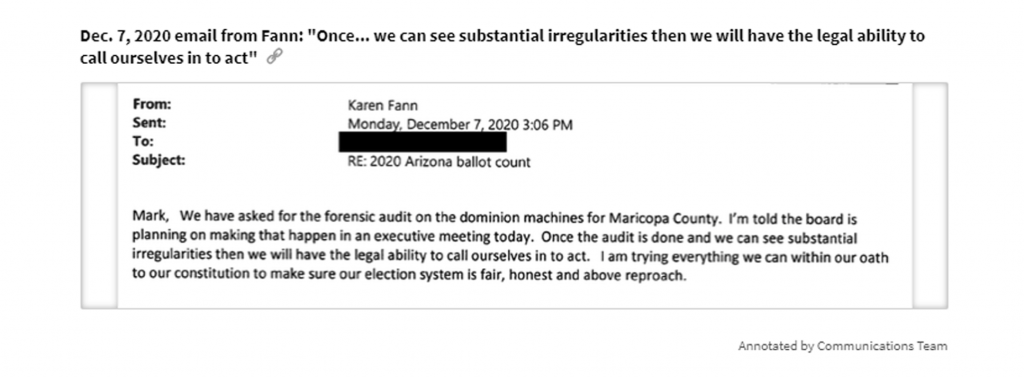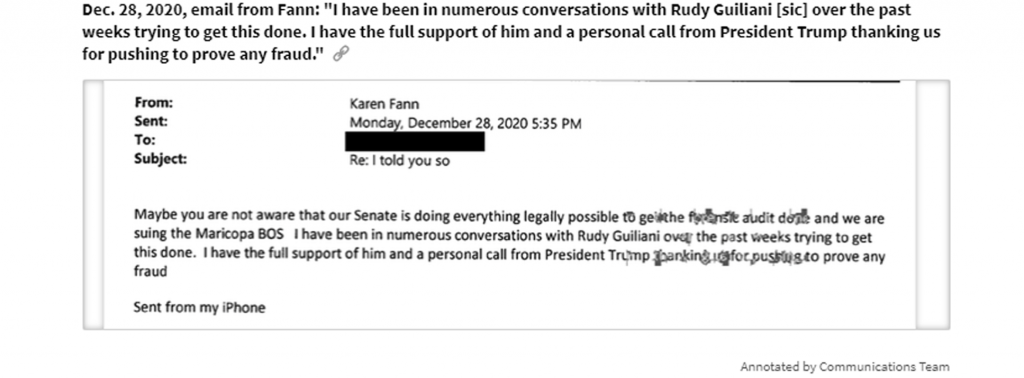The continued proliferation of “The Big Lie,” the baseless claim that the 2020 presidential election outcome was the result of massive fraud and other electoral misconduct, is being used as cover to attack American democracy and significantly weaken the laws that protect Americans’ ability to cast their votes and have their votes count. This false narrative was the rallying cry for the January 6 insurrection at the nation’s Capitol and has been used as the justification for numerous initiatives by state legislatures to alter their election laws to seriously hinder or even outright deny the voting rights of U.S. citizens.
Now comes the audit of the 2020 election results in Maricopa County, Arizona, ordered by the Republican majority of the Arizona Senate in April 2021, representing one of the most recent attempts to undermine the integrity of America’s electoral process. Not only has the audit been conducted in service of baseless claims about the election, but the audit process and its results may be utilized to undermine popular confidence in our electoral system nationwide, thereby enabling the disenfranchisement of millions of Americans.
This chronology provides a fact-based account of the 2020 election process in Maricopa County and the subsequent review of that process initiated by the Arizona Senate majority. The chronology represents a comprehensive review of pertinent legal, administrative, and political events in Arizona, and each entry includes a link to the source or sources on which it is based. As such, the chronology provides readers with an in-depth understanding of the relevant facts and circumstances, and demonstrates beyond doubt that the 2020 election results in Arizona—in Maricopa County and elsewhere—were legitimately counted and certified, without material abnormalities.
In particular, the chronology demonstrates:
-
- that the Maricopa County and statewide Arizona electoral authorities took all steps needed to ensure that the county’s November 3, 2020 electoral ballots were accurately counted and that the results were correctly reported, including verification steps that exceeded those called for under Arizona law;
- that the process for designation of the Arizona presidential electors took place in full compliance with federal law and the state’s eleven electoral votes were correctly certified for Joe Biden;
- that prior to the initiation of the Arizona Senate audit, the courts in multiple lawsuits brought by the Arizona Republican Party and others seeking to challenge the election results found no evidence of fraud or of failings in the Arizona electoral system—nor was there any other occurrence that would warrant a further recount;
- that the instigation of an audit of Maricopa County’s election returns was based on a desire to further The Big Lie that Donald Trump won the 2020 election and that Joe Biden is therefore an illegitimate president, as reflected in particular by disclosure of the Arizona Senate president’s post-election communications with Trump attorney Rudy Giuliani and others advocating measures that would support this contention;
- that the great majority of the funding for the audit has come from individuals and organizations associated with the propagation of baseless claims about the election;
- that the company contracted by the Arizona Senate to carry out the audit and its principal subcontractor had virtually no experience in conducting electoral audits and that their selection was based not on their independence but rather on their association with proponents of false election claims;
- that the subsequent performance by these companies in the conduct of the audit has included the use of unqualified personnel, failure to maintain ballot security, unorthodox ballot counting procedures, flawed forensic review based on conspiracy theories, false claims about Maricopa County officials destroying materials, inconsistent internal audit procedures, attempted exclusion of unbiased press reporting, and other actions that raise serious doubts about the credibility of anything these companies report; and
- that, rather than bolstering confidence in the American voting system through a competent, independent, and unbiased review process, the audit initiated by the Arizona Senate undermines America’s electoral process and thereby threatens the very foundation of our democracy: the integrity of the vote.
The Chronology: November 2020–September 2021
November 3, 2020: Election Day
Fox News calls Arizona for Joe Biden at 11:20 PM EST.
Jared Kushner phones Rupert Murdoch to complain about Fox’s Arizona election call.
AP calls Arizona for Biden at 2:51 PM. EST November 4.
November 4, 2020
Within hours of polls closing, false allegations that ballots marked with Sharpie permanent markers could not be read by scanning machines began to go viral, first statewide, then nationally. Despite refutations by election officials, the “SharpieGate” conspiracy became a talking point for those who sought to invalidate the results of the election, including members of the Trump family.
November 7, 2020
In response to early election results appearing to trend toward Democratic candidates, Arizona Republican Party Chair Kelli Ward exchanges texts with Maricopa County Supervisor Clint Hickman, telling him: “we need you to stop the counting.”
November 9, 2020
Under Arizona Election law (A.R.S. 16-602), county election officials are required to conduct a bipartisan hand count of a sample of ballots to ensure the accuracy of the voting machines. The counties report the results to the Arizona secretary of state. Under Arizona law, the state Vote Count Verification Committee establishes the designated, acceptable margins for conducting hand counts. Ten of the fifteen Arizona counties conducted hand count audits between November 4 and November 7 and all ten audits passed. Maricopa County completed and passed its hand count on November 4, 2020. The Arizona Secretary of State Katie Hobbs reported that, in Maricopa County, “No discrepancies were found” by the Hand Count Audit Board.
Arizona Senate President Karen Fann sends a letter to Secretary Hobbs expressing general concerns about the fairness of the election, but did not claim that fraud was involved. She also called specifically on Maricopa County to expand its hand count audit above the legally required 2 percent of ballots cast to 5 percent.
November 11, 2020
Decision Desk HQ calls Arizona for Biden.
Arizona Republican Attorney General Mark Brnovich states in an interview that Biden will win the election.
November 11–13, 2020
NBC, ABC, CNN, and The New York Times call Arizona for Biden.
November 17, 2020
After receiving a letter from Republican congressional representatives requesting a “100 percent audit of ballots cast,” then-current Maricopa County Board of Supervisors Chair Clint Hickman calls on the public to “dial back the rhetoric, rumors and false claims” surrounding the 2020 election. In a letter, Hickman asserts: “No matter how you voted, this election was administered with integrity, transparency and in accordance with state laws.”
November 18, 2020
As required by law, the Maricopa County Elections Department conducted a post-election logic and accuracy test (L&A Test) on county voting equipment open to the public via live stream. The L&A Test ensures that no changes were made to any software during the election process. The Maricopa County Board of Supervisors also invited the state of Arizona to conduct its own independent L&A Test.
November 19, 2020
An Arizona Republican Party motion for a preliminary injunction enjoining Maricopa County Board of Supervisors from certifying the ballots is denied.
November 24, 2020
The State of Arizona Official Canvass for the 2020 General Election is completed and shows that Joseph R. Biden has won the state by a margin of 10,457 votes. (The official declaration of the canvass occurs on November 30.)
During a Tuesday morning appearance on KTAR’s The Mike Broomhead Show, Republican Governor Doug Ducey said he expected the state to certify Biden’s win and all other election results Monday, November 30: “I’ve said several times: Arizona is a good government state,” Ducey said. “I trust our election system. There’s integrity in our election system. Joe Biden did win Arizona.”
November 30, 2020
Secretary Hobbs and Governor Ducey sign the certificate of ascertainment for presidential electors in the presence of Attorney General Brnovich and Chief Justice Robert M. Brutinel. This certified that the Biden electors received the highest number of votes cast and were duly elected presidential electors. Certification is done pursuant to Arizona Revised Statutes § 16-648 (2019): “On the fourth Monday following a general election, the secretary of state, in the presence of the governor and the attorney general shall canvass all offices for which the nominees filed nominating petitions and papers with the secretary of state.” At the ceremony, Governor Ducey stated: “We do elections well here in Arizona. The system is strong.”
During the certification of the election results, Trump lawyers Rudy Giuliani and Jenna Ellis hold a conference in a Phoenix hotel, in the presence of nine Republican lawmakers, encouraging the legislature to “take over the conduct of the election.” Giuliani and Ellis had previously been denied a formal hearing at the Arizona Capitol by the House speaker and Senate president.
Rudolph Giuliani leaves voicemails for Republicans on the Maricopa County Board of Supervisors. In one message, Giuliani says, “I have a few things I’d like to talk over with you. Maybe we can get this thing fixed up. You know, I really think it’s a shame that Republicans sort of are both in this kind of situation. And I think there may be a nice way to resolve this for everybody.”
December 4, 2020
Senate President Fann exchanges emails with One America News Network (OANN) host Christina Bobb in which they discuss a plan for Bobb to forward to Fann various Trump campaign materials from Rudolph Giuliani designed to support allegations of Arizona election fraud. (See pages 309–64 of the collected emails.)
Senate President Fann and House Speaker Rusty Bowers call for an independent audit of Maricopa County Dominion election equipment.
December 7, 2020
Fann writes an email that states that the Senate will await the county’s audit results, and if the reports show irregularities, the chamber would take further action:
December 8, 2020
The federal “safe harbor” deadline to determine electors passes: “such determination made pursuant to such law so existing on said day, and made at least six days prior to said time of meeting of the electors, shall be conclusive, and shall govern in the counting of the electoral votes as provided in the Constitution” (3 U.S. Code § 5).
November–December, 2020: The Principal Cases
Following the election, Trump organizations and supporters filed various lawsuits in Arizona alleging fraud and other electoral misconduct. None of them succeeded. The following are summaries of the principal cases and their disposition.
Ward. v. Jackson et al., a case brought by the Arizona Republican Party chair challenging the Biden victory. The Arizona Supreme Court unanimously affirmed on December 8, 2020, the findings of the trial court that no evidence had been presented reflecting any fraud or misconduct in the vote calculations in Maricopa County nor did human error meaningfully affect the election outcome.
The trial court had allowed signature forgery experts chosen by both parties to examine a sample of 100 mail-in votes, and the experts found no evidence of fraudulent signatures. In addition, the trial court allowed inspection of a sample of 1,626 ballots out of the 27,869 ballots that had required individual scrutiny by county election staff. This review found a net gain of six votes for Trump, which if applied over the entire 27,869 ballots would result in a net gain of 103 votes.
The plaintiff thereafter sought review by the U.S. Supreme Court, which was denied.
Various other cases brought in state and federal courts seeking to overturn the election results were also rejected by the courts, including:
- Bowyer v. Ducey, a case brought in the Federal District Court in Arizona seeking to set aside the Arizona electoral results on the grounds of fraud, illegality and statistical impossibility. After review of the evidence provided, the court held, among other things, that such allegations need to be supported by clear and conclusive facts but were “sorely wanting of relevant and reliable evidence.” Accordingly, the case was dismissed on December 9, 2020, with the court stating “allegations that find favor in the public sphere of gossip and innuendo cannot be a substitute for earnest pleadings and procedure in federal court. They most certainly cannot be the basis for upending Arizona’s 2020 General Election. The Court is left with no alternative but to dismiss this matter in its entirety.” The plaintiffs then sought a writ of mandamus from the United States Supreme Court, which was denied on March 1, 2021.
- Arizona Republican Party v. Fontes, a case brought in the Superior Court of Arizona claiming that the post-election ballot sampling process in Maricopa County had not been carried out in a manner that accorded with state law and required being redone. In considering the issue, the court noted that the process had involved Republican, Democratic, and Libertarian party appointees hand-counting 2,917 ballots cast on voting machines and 5,000 mail-in ballots, with the results matching completely with the machine tabulations. The court denied the relief sought and also ordered the plaintiff to pay the defendant’s attorney’s fees. In doing so, the court stated: “Arizona law gives political parties a privileged position in the electoral processes on which our self-government depends. The public has a right to expect the Arizona Republican Party to conduct itself respectfully when it participates in that process. It has failed to do so in this case.” An opinion elaborating upon the November 18 dismissal was entered on December 21, 2020.
- Aguilera v. Fontes, a case brought in the Superior Court of Arizona by voters who allegedly experienced difficulties in voting and sought, among other things, a declaratory judgment that Arizona election officials failed to acquit their obligations under state law to conduct an effective and impartial election. Specifically, the officials allegedly failed to: maintain statutorily compliant electronic voting systems, afford plaintiffs with appropriate opportunities to correct mistakes, and allow sufficient access to poll watchers; thus they allegedly failed to “ensure a maximum degree of correctness, impartiality, and uniformity of election procedures”—failures that interfered with related constitutional rights. After review, the court dismissed the case on the basis, among others, of a “failure to produce evidence demonstrating entitlement” to the relief sought.
- Donald Trump for President v. Hobbs, a case brought in the Superior Court of Arizona alleging systematic poll-worker errors through providing voters with Sharpie pens that potentially caused their ballots to be misread by the voting machines and then failing to address this problem. On November 13, 2020, plaintiffs filed a Motion of Partial Mootness once it was clear that the margin of the Biden victory exceeded the number of votes at stake in the lawsuit. The case was accordingly dismissed.
Further information on these and other cases brought to challenge the Arizona election results may be found by the Brennan Center, the States United Democracy Center and the Stanford-MIT Healthy Elections Project.
December 14, 2020
Arizona’s presidential electors convene and sign the official certificate of vote for Joe Biden and Kamala Harris. To ensure the safety of the electors, the Electoral College meeting is held at an undisclosed location.
December 15, 2020
Karen Fann directs Arizona Senate Judiciary Committee Chairman Eddie Farnsworth, without any vote in the Senate, to issue subpoenas to the Maricopa County Board of Supervisors to turn over voting equipment and ballots.
December 28, 2020
Senate President Fann emails a constituent indicating that the Senate effort has the full support of President Trump and Trump lawyer Rudolph Giuliani:
December 31, 2020
President Trump makes two attempts to contact Maricopa County Board of Supervisors Chair Clint Hickman. Hickman declines the calls. Later, Hickman expresses relief at his decision not to answer, then having read the transcript of the president’s conversations with Georgia Secretary of State Brad Raffenspeger (in which the president asked the state’s top election official to find enough votes to overturn the results).
January 6, 2021
The joint session of Congress held to count electoral votes and declare official election results is disrupted by rioters, who attack the Capitol and cause Congress to suspend the electoral vote count. After order is restored, Congress reconvenes and Vice President Mike Pence officially announces that Joe Biden was the winner of the 2020 presidential election at 3:44 AM EST the following day.
The Senate voted against sustaining the objection to Arizona’s electoral votes by a vote of 6–93. The House voted against sustaining this objection by a vote of 121–303.
January 19, 2021
Two Fox News executives responsible for the election night call for Biden leave the network.
January 20, 2021
Joseph R. Biden, Jr. is inaugurated as 46th president of the United States.
January 27, 2021
After negotiating with the Arizona Senate, the Maricopa County Board of Supervisors votes unanimously to approve a forensic audit of ballot tabulation equipment. The county hires Pro V&V and SLI Compliance, “two independent firms certified by the U.S. Election Assistance Commission, to each independently audit the tabulation equipment.” As an added measure of transparency and accountability, “Leadership from both the House and Senate, members of all three political parties, and representatives from the Arizona Secretary of State’s Office and Attorney General’s Office will be invited to observe.
January 29, 2021
Before the Maricopa County audit begins, Senate President Fann announces that the Arizona Senate is not satisfied with the scope of the audits and has hired its own contractor to conduct a review of the subpoenaed ballots. (The Arizona Senate Republican Caucus issues a statement.)
February 8, 2021
An Arizona State Senate resolution to hold the Maricopa County Board of Supervisors in contempt for noncompliance with the audit, opening the door to their arrest, fails by one vote.
February 23, 2021
Results of the two official Maricopa County audits are announced, finding no irregularities. SLI Compliance issues its forensic audit report, Pro V&V issues its field report and Maricopa County Government posts its account of the audit.
Note: The U.S. Election Assistance Commission established an accreditation process for voting system laboratories; the only two companies currently certified are Pro V&V and SLI Compliance.
February 24, 2021
Senate President Fann responds to the results of the Maricopa County audits, claiming that there are still allegations of serious problems. Fann also claims that “tens of thousands of ballots” may be unaccounted for.
February 25, 2021
A Maricopa County Superior Court judge rules that the Arizona Senate is within its rights to subpoena ballots for review.
March 31, 2021
The Arizona Senate announces that Sarasota, Florida-based Cyber Ninjas, Inc., a cybersecurity firm with no experience in election auditing, will lead an audit of the ballots cast in Maricopa County in the 2020 election. The Arizona Senate indicates it will pay Cyber Ninjas $150,000 for the work, but millions more have been raised from private individuals and organizations. The basis for choosing Cyber Ninjas was done without public explanation despite two more qualified applicants. Fann and her staff had solicited several firms and received two proposals, one for $415,000 from Clear Ballot, a vote counting firm that has conducted hundreds of audits around the country for over thirteen years. A second, from cybersecurity firm Intersec Worldwide, was for approximately $8.05 million.
The principal subcontractor hired by Cyber Ninjas, Inc. is Wake Technology Services, Inc. (Wake TSI), a company with very limited experience on election matters. Wake TSI had previously been hired by Trump Campaign lawyer Sidney Powell’s group, Defending The Republic, as a subcontractor to audit election equipment in Fulton County, Pennsylvania, at the request of State Senator Doug Mastriano, who was among the crowd outside the Capitol during the January 6 insurrection and who would later tour the Maricopa audit site (see June 2, 2021).
April 1, 2021
Arizona Secretary of State Katie Hobbs sends a letter to the Maricopa Board of Supervisors, requesting that they “do what is necessary to protect our voters and our democracy,” adding via Twitter that, “[i]f the Senate’s intent was to build confidence in elections they wouldn’t have hired these conspiracy theorists.”
April 6, 2021
Voters rights groups write a letter to Cyber Ninjas CEO Doug Logan warning him that confronting voters face-to-face through a door-knocking campaign under color of law is a violation of state and federal law.
April 22, 2021–June 2021 (Ongoing): Conduct of Senate Republican Audit
Ballot Counting
The hand recount of Maricopa County ballots deviates from standard procedures. As previously noted, Cyber Ninjas, the firm hired to coordinate the Arizona Senate effort, had no prior experience in this area. For example:
- Pens: It was reported that vote counters were initially given blue pens, rather than red. Blue ink can be read by ballot marking devices and could be conceivably used to ruin or falsify ballots by volunteers. An Arizona newspaper reporter had to convey this information to Doug Logan, head of Cyber Ninjas, who was unaware.
- Counting procedures: Prior to the start of the audit, Logan confirmed that there were no procedures set up to ensure bipartisan counting boards, a practice which is standard for normal hand counts. Additionally, volunteers were instructed to read their current tally aloud several times during the count; under Arizona law, tallies should be documented independently and not compared until the end of each batch.
- “Lazy Susans”: In an effort to speed up the process, ballots are presented to volunteers working six-hour shifts on rotating conveyors resembling a lazy Susan (a spinning, elevated table tray). This method is not standard for audits or recounts, as it creates time pressure on the vote counters to evaluate each ballot before it passes through the system.
Forensic Investigations
This component of the effort, guided by baseless conspiracy theories that allege foreign or domestic meddling, tasks untrained volunteers to identify and separate ballots which supposedly have been compromised.
- Watermarks: Initially, ballots were scanned with ultraviolet lights to test for watermarks that could purportedly prove or disprove the legitimacy of the paper on which they were printed, based on a QAnon theory alleging that all official ballots would carry watermarks, whereas fake ballots would not. The Maricopa County Elections Department has stated that it does not use such markings.
- Bamboo fibers: Stemming from another theory claiming that 40,000 ballots were flown in from Asia, volunteers have been tasked with inspecting ballots for bamboo fibers. According to the Washington Post, the methods being used by volunteers would not be sufficient to detect bamboo fibers, even if they did exist.
- Paper examination process: The technology being used to examine ballots for folds or markings which may indicate the vote was cast fraudulently was developed by Jovan Pulitzer, known for creating what has been called the “worst gadget of all time”. One veteran audit observer wrote that, in her experience as a local election official, voters will fold a ballot “any which way,” and often get substances like coffee and food on their mail-in ballots.
Involvement of persons challenging the election results:
- OANN and Christina Bobb: The access given to OANN to cover the recount effort presents an array of conflicts of interest. OANN is a conservative news outlet which has repeatedly peddled conspiracy theories claiming that Biden’s wins in Arizona and other states were illegitimate.
As noted above, emails reveal that Christina Bobb, a former Trump administration Department of Homeland Security official who hosts OANN’s Weekly Briefing segment, acted as a liaison between Trump advisor Rudolph Giuliani and Senate President Fann in the weeks following the 2020 election. Bobb provided Fann with materials from Giuliani regarding the Arizona election results (see December 4, above).
Bobb has played a number of pro-Trump roles since election day: lawyer for the Trump campaign, OANN reporter covering and raising money for the audit, and informal liaison with President Trump regarding the audit progress.
With respect to the fundraising, Bobb founded an organization, Voices and Votes, which has donated at least $150,000 to the audit effort. Bobb has made on-air fundraising appeals for the audit, and Fann has referred at least one constituent to the Voices and Votes website. Bobb’s organization is also funding visits to the Arizona audit by Republican legislators from other states (see June 7, below), though it is unknown what percent of the funds collected have been spent.
- Doug Logan: Doug Logan is the CEO of Cyber Ninjas, the firm hired by the Arizona Senate to conduct the audit. Tweets from Logan’s deleted Twitter account indicate that he supports “stop the steal” sentiments. Logan previously authored a document for Sidney Powell, a pro-Trump attorney, which encouraged U.S. senators to vote against the January 6 certification of the Electoral College votes based on unsubstantiated claims of fraud.In late 2020, Logan worked to investigate claims of fraud while staying at a property owned by pro-Trump attorney L. Lin Wood, who, along with Powell, filed several post-election lawsuits on behalf of the Trump campaign. Wood’s nonprofit organization has since donated at least $50,000 to the recount effort.
- Others: Patrick Byrne, the pro-Trump former CEO of Overstock.com whose Twitter account was suspended for inciting election violence, has reportedly donated $500,000 of his own money to the audit, and through the America Project, which he co-founded with former general Michael Flynn, raised another $1.2 million from unknown sources.
Arizona State Representative Mark Finchem, a pro-Trump candidate for Arizona secretary of state who denies the outcome of the 2020 election, has stated that his organization, Guardian Defense Fund, is “paying money for additional security at the site.”
Former Republican State Representative Anthony Kern volunteered as a counter for the effort, though he appeared as a candidate on the ballots being counted. Kern lost his 20th District seat in 2020, and appeared at the January 6 riot at the U.S. Capitol.
False claims:
- Destruction of data: On May 12, 2021, the @ArizonaAudit account tweeted: “Maricopa County deleted a directory full of election databases from the 2020 election cycle days before the election equipment was delivered to the audit.” On the same day, Senate President Fann wrote a letter to Maricopa County Board of Supervisors Chairman Jack Sellers alleging that an entire database directory that was required by the subpoena had been deleted.In reality, the files had not been erased. The firm hired by the Arizona Senate had merely been unable to access the data. The County Recorder’s Office wrote in their response to Fann’s letter: “The failure of the Senate’s so-called ‘auditors’ to locate files on a copy they made of the County’s server speaks more to their ineptitude than it does to the integrity of our dedicated employees.” In a separate letter, the Board of Supervisors called Fann’s claims “false, defamatory, and beneath the dignity of the Senate.”
- Chain of custody: In the May 12 letter mentioned above, Fann accused the county of breaking the chain of custody of ballots. However, on April 29, 2021, Senate liaison and former Arizona secretary of state Ken Bennett approved a Chain of Custody Document that included signed manifests and delivery load information, affirming that the Senate accepted the materials and that they were satisfactorily secure.
Exclusion of Press
Though Senate President Fann has made statements emphasizing the importance of transparency in the GOP recount effort, Cyber Ninjas, the firm hired by the Senate, initially sought to keep its policies and procedures a secret from the public and the press. The firm also asked the court to block reporters from covering court proceedings. Both of these requests were denied by a Superior Court judge.
Nevertheless, local reporters have been forced to watch the audit from a prohibitive distance, or have been barred completely from the process. Local media had to file a lawsuit in order to gain access to the audit as anything more than observers working in six-hour shifts. On April 30, 2021, Ryan Randazzo, an Arizona Republic reporter, was kicked out of the audit site by Wake TSI after revealing that former state representative Anthony Kern (mentioned above) was present at the facility and reviewing 2020 ballots on which his name appeared. Ballot details were not discernible in Randazzo’s photograph.
Though local and state media have found difficulties covering the audit, OANN has been granted unusual access. On April 21, 2021, it was revealed that OANN would be the sole livestreaming partner for the recount effort. As mentioned above, Bobb’s nonprofit organization, Voices and Votes, has donated at least $150,000 to fund the audit; and Bobb herself has made fundraising appeals on air.
Security
- Physical security concerns: According to observer reports, security gates and ballots have been left unattended, unauthorized pens and cell phones have been spotted near ballot counting areas, and firearms are allowed on the audit site floor. In a May 5 letter to Senate President Fann, Secretary Hobbs succinctly described the status of the Senate audit security situation: “The risk to the physical security of the ballots, and any remaining election equipment, is heightened now that the Crazy Times Carnival is operating alongside the Senate and Cyber Ninjas at the Coliseum, and you have stated ballots may remain stored at the Coliseum while various high school graduation ceremonies are conducted in the same facilities.”
- Cybersecurity concerns: Software malfunctions have reportedly forced Cyber Ninjas to create data backups mid-day. Data collected by the firm has been sent to a residential Montana address (described as a “cabin”) owned by Ben Cotton, the founder of CyFIR, a subcontractor for Cyber Ninjas, who was also responsible for the false claims of deleted data mentioned above.
- Social media access: For a period, the official Twitter account for the effort, @ArizonaAudit, was being run by “kind of a committee” of volunteers, according to Senate Liaison Ken Bennett. Officials were temporarily unable to regain control of the account, or even log in, after it began sending “inflammatory tweets and outlandish statements.”
- Voter intimidation concerns: A letter from the U.S. Department of Justice (see May 5, below) to the leaders of the audit effort expresses concern that Cyber Ninjas may have been “working ‘with a number of individuals’ to ‘identify voter registrations that did not make sense, and then knock on doors to confirm if valid voters actually lived at the stated address.’” The letter suggests that this practice would be in violation of Section 11(b) of the Voting Rights Act, which outlaws voter intimidation.
April 28, 2021
Over objections from the Cyber Ninjas that its procedures should remain secret, a Maricopa County Superior Court judge rules that Cyber Ninjas must publicly disclose its procedures for ensuring voter privacy. Cyber Ninjas releases three short documents covering (1) floor counting procedures, (2) evidence handling, and (3) digital evidence. The documents do not appear to all be relevant to voting or auditing.
May 5, 2021
A letter from Secretary Hobbs is sent to Arizona Senate Liaison Ken Bennett regarding the inadequacies of the Senate audit. The topic headings describing the deficiencies are as follows: (1) procedures are vague and insufficient to ensure accuracy and consistency; (2) counting process incorporated untested, uncertified systems; (3) counting process departs from best practices for accurate hand tallying; (4) procedures do not detail a clear process for aggregation; (5) procedures fail to adequately protect and document chain of custody; (6) “forensic audit” of ballots lacks any credibility or basis in actual election operations; and (7) no procedures for hiring qualified, unbiased counters.
In addition, the letter states that the Senate audit, based on observer reports, was also deficient in the following areas: (1) inadequate physical security of ballots; (2) no livestreaming or observer access to the forensic processing of election equipment; (3) computers at “forensic analysis” tables left unattended; (4) risk of commingling counted and uncounted ballots in a batch, leading to some ballots being double-counted and others not being counted at all; (5) constantly changing rules cause confusion and counting errors, and undermine the reliability of the results; and (6) frequent violations of the limited procedures and disregard for best practices or basic security.
Pamela Karlan, principal deputy assistant attorney general in the Civil Rights Division of the U.S. Department of Justice, sends a letter to Senate President Fann expressing concern that the audit was violating federal statutes regarding the safeguarding of federal ballots and that the statement of work proposed by Cyber Ninjas raised concerns of voter intimidation.
May 7, 2021
Senate President Fann sends a letter to Karlan responding to the May 5 letter, denying that the audit was not safeguarding ballots and stating that the plan to canvass individual voters had been indefinitely deferred.
May 11, 2021
Voting Booth, a program of the Independent Media Institute, reports that the Arizona Senate’s hand count of 2020 ballots is unlikely to match the official election results certified by the state due to the Senate audit’s imprecision at key junctures of its process.
May 12, 2021
As noted above, Senate President Fann sends a letter to Jack Sellers, chairman of the Maricopa County Board of Supervisors, accusing the county of, inter alia, noncompliance with legislative subpoenas, failure to comply with chain of custody practices, and deletion of election files.
Audit spokesman Ken Bennett announces that the official Twitter account of the audit is back under official control after he had handed over control to “kind of a committee” of unnamed individuals that had been making “inflammatory tweets and outlandish statements.”
May 14, 2021
Grant Woods, former Republican Arizona attorney general, calls the Senate audit effort a “clown show” and a “joke.”
May 17, 2021
The Maricopa County Board of Supervisors (of which four of the five members are Republicans) unanimously approves a letter to Senate President Karen Fann calling on her to end the hand recount of ballots which began April 23, with board chairman Jack Sellers describing the election review as “a grift disguised as an audit.”
May 19, 2021
Jan Brewer, former Republican governor of Arizona, criticizes the audit on a radio show, saying “I think they should maybe just call it quits. I don’t think that it’s going to serve any purpose. It’s not going to change the election,” and that “the votes have been certified. Biden is the president. It’s not changing. I say move on.”
May 21, 2021
Jeff Flake, former Republican U.S. senator from Arizona, says that the Arizona Senate effort is “amateur hour” and “horrible for democracy.”
May 22, 2021
An analysis of every vote cast by a longtime election observer and election technologists familiar with vote-counting data finds that the original vote count was accurate.
May 24, 2021
Republican Maricopa County Auditor Stephen Richer, elected in 2020, compares the Arizona Senate effort to an incompetent and predetermined tax assessment (see below):
You probably just did ur taxes. You did them properly, and there is nothing to hide. Would you want them looked at by an auditor who:
1) Is incompetent
2) Has done barely any work in taxes
3) Believes in conspiracy theories
4) Stated before examining that u committed tax fraud
?— Stephen Richer—Maricopa Cnty Recorder (prsnl acct) (@stephen_richer) May 24, 2021
May 25, 2021
Wake TSI withdraws from the recount effort, thus disrupting any continuity or consistency of the auditing process. Little explanation except expiration of contract is offered. StratTech Solutions, an information technology company with no apparent audit experience, which reportedly had been assisting with the effort since the beginning, takes over using the procedures established by
Wake TSI. Senate Liaison Ken Bennett defends the choice, saying that “Nobody should be precluded from doing something the first time.”
May 27, 2021
Maricopa County Recorder Stephen Richer (a Republican) pens an op-ed in the National Review, again comparing the Arizona Senate’s review of ballots to an inept and biased tax audit. In the opinion piece, Richer reiterates the results of audits conducted by SLI Compliance and Pro V&V (see February 23, 2021), which confirmed that Maricopa County ballot tabulation equipment functioned correctly in 2020.
June 2, 2021
Three state legislators from Pennsylvania—Senator Doug Mastriano, Senator Cris Dush, and Representative Rob Kauffman—visit the audit site in Phoenix and are shown around the facility by Cyber Ninjas CEO Doug Logan.
Afterward, one of the legislators, Senator Dush, says he “absolutely, without question” wants an audit like the one in Maricopa County to be replicated in Pennsylvania, despite election experts identifying “major flaws in the process.”
Arizona Secretary of State Katie Hobbs announces that she will seek the Democratic nomination in the 2022 gubernatorial race.
June 6, 2021
Conservative talk radio host Mike Broomhead, who once backed the audit, pivots his position and accuses Republicans of “turning this into the sideshow at the state fair.”
Bill Gates, a Republican Maricopa County supervisor, says that the nature of the proceedings has thoroughly undermined the purported goal of the audit, stating: “I don’t see how anyone in their right mind can argue what’s been going on at the coliseum is instilling any voter confidence.” Gates also questions why the process isn’t being called out by other Republicans.
June 7–13, 2021
Current and former Republican officials and candidates from various other states visit the site. An organization founded by OANN reporter Christina Bobb has reportedly financed the travel expenses of at least four of these visitors.
Among the visitors were Alaska State Representative David Eastman; Georgia State Representative Vernon Jones; Colorado State Representative Ron Hanks; and Virginia State Senator Amanda Chase, all of whom participated in pro-Trump events in Washington, D.C. that preceded the January 6 riot at the U.S. Capitol, in addition to the aforementioned Pennsylvania State Senator Doug Mastriano of Pennsylvania.
June 9, 2021
Reports emerge of a division within the ranks of officials in charge of the audit, with Senate President Karen Fann and former Secretary of State Ken Bennett supporting the hiring of a California firm, Citizens Oversight, to conduct a digital analysis of Maricopa County ballot images, while others, including State Senator Kelly Townsend and anonymous online moderators of a Telegram account opposing any additional review of the ballots.
June 10, 2021
Arizona Attorney General Mark Brnovich announces that he will seek the Republican nomination in the 2022 U.S. Senate race.
June 11, 2021
A team of experienced election auditors, including Clear Ballot alumni and Republican voting experts, challenges the Cyber Ninja audit team, claiming that it can be proven conclusively using publicly available data that Joe Biden won the election in Arizona because GOP voters shunned President Trump.
In their letter, these expert auditors wrote: “We now have the capability to determine the ballot count and vote results for all of the elections on any batch and any box of ballots that were delivered to the [Cyber] Ninjas under the [Senate’s] subpoena, without ever looking at a single ballot.”
Senate President Fann refuses to respond.
Attorney General Merrick Garland delivers a speech on voting rights. Speaking about the several states that have recently moved to make voting more difficult, but not mentioning Arizona by name, Garland said “some jurisdictions, based on disinformation, have utilized abnormal post-election audit methodologies that may put the integrity of the voting process at risk and undermine public confidence in our democracy.”
June 13, 2021
Voting Booth reports that Doug Logan, CEO of Cyber Ninjas, opposes the hiring of Citizens Oversight to conduct a detailed digital review of ballots (see June 9 above). Logan has reportedly sought to stop Ken Bennett, senate liaison and audit spokesperson (who supports the Citizens Oversight review), from talking to press, and discredited Bennett in private conversations with visiting legislators.
June 16, 2021
CNN investigates the private Montana estate where data from the audit has been trucked across state lines to be “forensically evaluated.”
June 19, 2021
Conservative radio host Mike Broomhead casts doubt on the effectiveness of the Arizona Senate recount effort, saying that the leaders are “speaking only with people who believed ahead of time that the election was stolen, and they haven’t really produced any evidence to the contrary other than things that have been released on social media,” and that he thinks the audit is “stoking more of a division in the party than it is any kind of unity with voters in Arizona.”
June 22, 2021
MSNBC reports that the filmmaker who has been allowed access to top officials in order to create a documentary on the audit has also produced films in which interviewees allege that extraterrestrials were responsible for 9/11 and that Nazis occupied the Moon as early as 1939.
The nonpartisan States United Democracy Center releases a report, coauthored by two leading national election experts, that reviews the audit procedures and voting machines and finds a number of defects that call into question any eventual findings by Cyber Ninjas: “Because it lacks the essential elements of a bona fide post-election analysis, the review currently underway in Maricopa County will not produce findings that should be trusted.”
June 23, 2021
CNN interviews the president and CEO of Runbeck Election Services, Inc., the company that printed and provided nearly all of Maricopa County’s ballots, who says there is “no way” that the ballots could have been watermarked or interfered with in the way that conspiracy theorists have alleged.
June 27, 2021
Cyber Ninjas CEO Doug Logan appears in a film called The Deep Rig, which alleges that the 2020 election was stolen based on a host of false conspiracy theories. The filmmaker, Roger R. Richards, is known for directing so-called documentaries which allege extraterrestrial and “deep state” conspiracy theories, including speculation that Nazis obtained alien technology from a moon base camp and hid the evidence in Antarctica.
Upon viewing the film, Arizona Republic reporter Jen Fifield tweets that the Senate’s contractors let the film crew into a cage containing the ballots, severely compromising their security.
June 28, 2021
Maricopa County announces that it will not reuse voting machines acquired by the Senate for its audit of election results, due to security and integrity concerns. In a letter to Secretary of State Katie Hobbs, County Attorney Allister Adel indicates that the Board of Supervisors shares the secretary’s concerns that voting machines were placed “under the control of persons not certified to handle election equipment in the United States.” The total cost for replacing the machines is later revealed to be $2.8 million.
July 2, 2021
The Arizona Republic reports for the first time on phone calls by then-President Trump, his personal attorney Rudy Giuliani, and Arizona Republican Chair Kelli Ward made to influence Maricopa County supervisors during post-election processes (see November 7, 2020, November 30, 2020, and December 31, 2020–January 3, 2021).
July 6, 2021
A group of four election experts tell the Arizona Republic that, due to the bias and conduct of the contractors, volunteers, and officials running the audit, the results will be inaccurate at worst, and incomplete at best.
July 7, 2021
Citing the July 2 Arizona Republic report on phone calls made by the former president and his associates, Arizona Secretary of State Katie Hobbs asks Arizona Attorney General Mark Brnovich to open an investigation into then-President Trump’s and Rudolph Giuliani’s voicemail messages to Maricopa County Supervisors (see November 30, 2020 and December 31, 2020).
In her letter, Secretary Hobbs indicates that the actions by Trump and his associates may have violated Arizona Title 16, which states that anyone who “knowingly interferes in any manner with an officer of such election in the discharge of the officer’s duty, or who induces an officer of an election or officer whose duty it is to ascertain, announce or declare the result of such election, to violate or refuse to comply with the officer’s duty or any law regulating the election” is subject to investigation and prosecution. Hobbs asks Brnovich to refer the matter to another agency if his ethical duties prevent him from enforcing the matter.
July 8, 2021
The Arizona Republic reports that at the state fairgrounds facility that is being used by the Senate for their efforts, “the indoor temperature [is] 88 degrees and humidity [bounces] between 45% and 55% percent.” The state fairgrounds website says the building “is not recommended for use between May through September” because of high temperatures.
Tammy Patrick, who worked with the Maricopa County Elections Department from 2003 to 2014, later notes that humidity affects ballots and paper and equipment, and calls the Senate’s auditors “fools” for using the facility.
July 12, 2021
Maricopa County Recorder Stephen Richer writes in USA Today that in every significant way, the rules for the Arizona Senate’s ballot review are “far less demanding” than the ones used by Maricopa County in earlier, legitimate audits (see February 23, 2021).
July 14, 2021
The U.S. House Oversight Committee launches an investigation into the Arizona Senate’s ballot review effort, citing allegations of “mismanagement and insecure practices that jeopardized the integrity of ballots.” The chairs send a letter to Doug Logan, CEO of Cyber Ninjas, requesting information on his company’s role in the “audit.”
July 15, 2021
In a case brought to obtain Cyber Ninja’s records regarding the audit pursuant to Arizona’s public records disclosure law, Maricopa County Superior Court Judge Michael Kemp rejects the Arizona Senate Republicans’ argument that such records were not covered by that law. In denying the defendants’ motion to dismiss the case, Judge Kemp states that keeping such records, including information on the private funding sources of the audit, beyond the reach of disclosure would “erode any sense of transparency” in government. He adds that: “[i]t is difficult to conceive of a case with a more compelling public interest demanding public discourse and public scrutiny.”
Arizona Senate President Karen Fann holds a hearing with Cyber Ninjas CEO Doug Logan to discuss the audit, during which:
- Fann indicates that the Senate will require more materials and data from Maricopa County to complete its process.
- Logan revives the idea of going door-to-door to question voters about their voter participation, a practice which the U.S. Department of Justice had previously warned could be considered voter intimidation (see May 5, 2021).
- Logan contended that Maricopa County counted some 74,000 more mail-in ballots than were sent to voters. After an investigation proved this to be untrue, Logan conceded that he failed to distinguish between two types of legitimate ballots.
- Logan questioned why over 11,000 people were added to the county’s voter rolls after the election, failing to recognize that voters who cast provisional ballots and are found to be eligible are subsequently added to the rolls.After investigating Logan’s claims, Maricopa County Spokesman Fields Moseley tells KAWC that the allegations (and, by extension, former President Trump’s statement the following day) are completely without merit and drawn from a misinterpretation and misunderstanding of election records. Nevertheless, Logan’s claims set off a nationwide wave of disinformation.
July 16, 2021
In response to Secretary of State Katie Hobbs’ July 7 email, Arizona Attorney General Mark Brnovich’s office asks Hobbs for potential evidence of illegal voting.
The Associated Press reports that “Arizona county election officials have identified fewer than 200 cases of potential voter fraud out of more than 3 million ballots cast in last year’s presidential election.” (Trump lost in Arizona by 10,457 votes.)
A concurrent AP investigation finds that there were “182 cases where problems were clear enough that officials referred them to investigators for further review. So far, only four cases have led to charges, including those identified in a separate state investigation. No one has been convicted. No person’s vote was counted twice.”
July 23, 2021
In a video live-streamed from a private jet, Jovan Pulitzer, the entrepreneur responsible for inventing the unproven technology that the Senate used to attempt to locate folds or bamboo fibers in ballots (see the Conduct section above), claims that the audit process to date has cost $9,000,000. Financial documents released five days later revealing the actual total would go on to disprove Pulitzer’s claim.
Senate Liaison Ken Bennett is denied access from the ongoing third recount effort after a disagreement over who should conduct the new count. After the Cyber Ninja’s tally didn’t match Maricopa County’s numbers, Bennett apparently suggested that a new firm be used, and consulted with an outside group himself. According to Bennett, he “allowed some information that was supposed to be private to get out,” and the person he met with “leaked it to the press, and I [Bennett] felt bad about that. Obviously Mr. Pullen and maybe the Senate and others were upset. And so that’s why I was denied access.” By this time, Co-liaison Randy Pullen had already taken over the operations at the Veterans Memorial Coliseum.
July 24, 2021
State Senator and candidate for Arizona Secretary of State Michelle Ugenti-Rita (a Republican) is booed off stage at a rally featuring former President Donald Trump in Phoenix. Senator Ugenti-Rita, who initially supported the Arizona Senate’s audit effort, has since soured on the concept.
In a Twitter thread later that day, she wrote: “Sadly, it’s now become clear that the audit has been botched. The total lack of competence by [Senate President Karen Fann] over the last 5 months has deprived the voters of Arizona a comprehensive accounting of the 2020 election.”
Former President Donald Trump appears at a Turning Point USA rally in Phoenix and asks state Senators Sonny Borelli and Wendy Rogers to force Maricopa County to turn over internet routers to the Senate.
July 26, 2021
The Maricopa County Elections Department launches “Just the Facts,” an interactive tool designed to refute false claims about the 2020 presidential election.
Senate Liaison Ken Bennett announces that he is “close to stepping down” from the audit after being denied access to the facility (see July 23, 2021), also citing Cyber Ninjas’ conduct of the process and refusal to share information as sources of frustration. In a radio interview, Bennett states: “I’m the liaison, and I think when people hear that word, they think, ‘OK, he’s in charge of it.’ But that has not been the case.”
Days after former President Donald Trump calls for access to Maricopa County network routers, the Arizona Senate issues a new subpoena demanding that the county turn over the envelopes from all mail-in ballots or images of them, network routers and traffic logs, detailed voter registration records with change histories, and records related to security breaches of election systems, in an apparent increase in the scope of the audit.
July 27, 2021
In another sign that the Arizona Senate’s effort is expanding, Senate President Karen Fann issues a public records request demanding any communications Arizona Secretary of State Katie Hobbs, a Democrat, has had with anyone about the audit and the litigation it has produced. Fann’s request would cover federal, state and local officials as well as political parties, volunteers, consultants, vendors, formal or informal advisors, fundraisers and the media. Fann states that she “can’t disclose what we’re looking for at this time.”
Twitter permanently suspends the official account of the Arizona audit effort, @ArizonaAudit, as well as the semi-official account “Audit War Room” for violating rules on platform manipulation and spam. Some organizations that were raising money to fund the efforts also were removed from the platform.
Senate President Karen Fann issues a press release indicating that Ken Bennett remains a part of the Senate’s efforts. The release states that Bennett “will be involved and a vital part of the draft and final reports to ensure their accuracy with his knowledge and contributions throughout the audit process.”
July 28, 2021
Senate Liaison Ken Bennett announces he is stepping down, stating that “being locked out makes it impossible for me to be a true liaison.” Audit spokesman Randy Pullen confirms that Ken Bennett has been removed as liaison for the effort and that he [Pullen] ordered security at Veterans Memorial Coliseum not to allow Bennett back on the premises. Later that day, Bennett backtracks, announcing late in the day that he and Senate President Karen Fann have reached an agreement allowing him to continue his work.
Cyber Ninjas CEO Doug Logan releases a list of funders of the Senate’s effort, revealing that five groups were responsible for providing more than $5.7 million. The America Project, a nonprofit group started by pro-Trump former Overstock.com CEO Patrick Byrne, contributed $3.2 million, with $1 million reportedly coming directly from Byrne himself (see the Conduct section). America’s Future, a nonprofit chaired by former Trump administration national security adviser Michael Flynn, contributed nearly $1 million. $605,000 came from Voices and Votes, an organization founded by Christina Bobb, a former Executive Secretary for the Trump administration’s Department of Homeland Security and media personality on the pro-Trump outlet One America News Network, which had stricken an exclusive deal to livestream the Senate’s efforts (see the Conduct section of this document).
The U.S. Department of Justice announces the release of two guidance documents to ensure states fully comply with federal laws regarding elections, specifically federal statutes affecting methods of voting and federal constraints related to post-election audits.
July 30, 2021
Senate President Karen Fann and Senate Liaison Ken Bennett issue a joint statement announcing that Bennett will remain in his role and will once again be given full access to the audit.
August 2, 2021
The New Yorker publishes “The Money Behind the Big Lie,” a detailed examination of the forces financing the Arizona Senate’s efforts, and other efforts to generally sow public distrust in the electoral process.
Notably, Maricopa County Supervisor Bill Gates is quoted in the article. Gates claims that Karen Fann, the Arizona Senate’s president, confided to him that she knew there was “nothing to” the charges of fraud in Arizona, but she buckled under political pressure and authorized a subpoena of the county’s ballots.
The Maricopa County Board of Supervisors and an attorney for Dominion Voting Systems reject the Arizona Senate’s July 26 subpoena, refusing to turn over additional requested materials, but complying to a public records request.
Chair of the Maricopa County Board of Supervisors Jack Sellers (a Republican) pens a letter in response to the Arizona Senate’s subpoena, telling the body to “move on:” “The board has real work to do and little time to entertain this adventure in never-never land.”
In an official statement the same day, Sellers writes: “The latest Senate demands are an attempt to distract attention from their botched audit and conspiracy-obsessed contractors.” Sellers also calls on the Senate to release the results of their “audit.”
The Maricopa County Board of Supervisors and an attorney for Dominion Voting Systems defy the Arizona Senate’s July 26 subpoena, refusing to turn over additional requested materials, on the grounds that the routers contain sensitive personal information relating to the County’s citizens, such as Social Security numbers and personal health information, as well as confidential law enforcement information.
Chair of the Maricopa County Board of Supervisors Jack Sellers (a Republican) pens a letter in response to the Arizona Senate’s subpoena, telling the body to “move on.” In an official statement the same day, Sellers writes: “The latest Senate demands are an attempt to distract attention from their botched audit and conspiracy-obsessed contractors.”
While Arizona Attorney General Mark Brnovich has opined that the county’s refusal to provide the routers is illegal under Arizona law, a respected conservative Republican attorney has published an op-ed that completely rebuts Brnovich’s analysis.
August 3, 2021
Republican elections consultant Benny White and former Clear Ballot Group CEO Larry Moore, who were involved in previous efforts to challenge the Arizona Senate’s methods (see June 11 and July 6, 2021), call on Senate President Karen Fann and the Cyber Ninjas to “make the results public and now.”
The two had previously shared the findings of their own research with Senate Liaison Ken Bennett, demonstrating to him that their methods, using public data, matched the Senate machine count at a level of accuracy exceeding 99.9 percent. Importantly, White and Moore also reported that Bennett had expressed to them serious concerns that the Cyber Ninjas might engage in “forced balancing,” whereby the results of a ballot count would be improperly brought into line with a previously determined objective (in this instance meaning a Trump victory in the state).
Maricopa County Superior Court Judge Michael Kemp orders that the Arizona Senate must release records pertaining to the ongoing audit effort under Public Records Law. An appeal is later filed.
August 4, 2021
Slate reports that Cyber Ninjas missed the U.S. House Oversight Committee’s deadline to produce all materials surrounding the audit (see July 14, 2021), and that the company requested additional time. According to a staff member, the committee’s expectation “is that the company will comply in full with our requests in short order. If they do not, then the Chairwoman [Representative Carolyn Maloney] will take steps to ensure we get the answers from them that we need.”
August 10, 2021
Dominion Voting Systems, the company that provides Maricopa County’s ballot tabulation machines, files $1.6 billion lawsuits against former Overstock.com CEO Patrick Byrne, One America News Network, and Newsmax for lost profits resulting from what the company describes as a “sustained disinformation campaign.” The lawsuit alleges that Byrne and OANN-affiliated personalities helped bankroll Logan, whom it called a “Deep State conspiracy theorist,” to conduct a “sham” audit in Maricopa County, damaging the company’s image with false claims of fraud.
August 11, 2021
In response to the Arizona Senate’s appeal regarding the release of Cyber Ninjas’ records pertaining to the audit, the Arizona Court of Appeals rules that the parties do not immediately have to turn over documents related to the audit, reversing the lower court’s ruling (see August 3, 2021).
August 16, 2021
The Arizona Republic reports that one-time Cyber Ninjas attorney Bryan Blehm “changed hats,” working for the state Senate last month as the Senate did an independent check on the Cyber Ninjas’ work. Audit spokesperson Randy Pullen attempted to justify the apparent conflict of interest by saying that Blehm, whose contract with Cyber Ninjas expired in June, was working under a “verbal contract” for the Senate and took no fee, despite working several shifts that ran longer than eight hours.
August 17, 2021
At a meeting of the National Association of Secretaries of State (NASS), a cross-partisan professional organization of secretaries from states across the country, members vote nearly unanimously to approve a series of recommendations for the conduct of post-election audits. A bipartisan group of eight secretaries reportedly worked for months to craft the guidelines, partially in response to the Senate’s efforts in Arizona.
Among the procedures recommended is that voting machines should be audited by a “federally or a state accredited test lab,” which Cyber Ninjas is not. The NASS members also recommended that the processes should be publicly transparent and involve the input of the state’s chief election official.
August 18, 2021
The Maricopa County Board of Supervisors lodges a notice of claim with the Arizona Senate for more than $2.8 million it spent on new vote-counting machines, which had to be decertified and replaced as a result of the Senate’s audit efforts (see June 28, 2021).
A judge orders that the Arizona Senate must release its records pertaining to the audit by August 31, 2021. This order does not apply to documents held by Cyber Ninjas. The Senate’s attorney, Kory Langhofer, responds that the Senate is preparing about 10,000 documents, including emails about the audit, to release an online archive where records from the audit are made public.
August 19, 2021
The Arizona Court of Appeals rules that Cyber Ninjas documents pertaining to the audit are public records, and must be released as such (see August 3, 2021 and August 11, 2021).
Three rebuttals to the impending Cyber Ninjas report are issued:
- From American Oversight: How the Arizona Election “Audit” Has Already Been Compromised
- From the Office of the Arizona Secretary of State: Report on the Partisan Review of the 2020 General Election in Maricopa County
- From Maricopa County Recorder Stephen Richer: Dear Arizona Republicans: Let’s do this right. Let’s build confidence. Let’s move forward.
August 31, 2021
In compliance with an August 18 order in the American Oversight lawsuit and a subsequent appeals court rejection of the Arizona Senate’s arguments against allowing public access to materials related to the audit, the Arizona Senate releases a cache of documents on its website. The documents include:
- Former Trump Chief of Staff Reince Preibus was in conversations with audit spokesman Randy Pullen as early as December of 2020 regarding the possibility of the Arizona Senate effort.
- Ex-Trump campaign official Jeff DeWit reportedly inquired on behalf of former President Trump about donating to the Guardian Defense Fund, one of the dark money organizations funding the audit, and later asked audit spokesman Randy Pullen about contributing, again on behalf of Trump, to another group called Fund the Audit.
- Senate President Karen Fann and Cyber Ninjas hired failed Massachusetts Senate candidate Shiva Ayyadurai to carry out a review of voter signatures on mail-in ballots. Like Cyber Ninjas, Ayyadurai has no qualifications in the field, but readily promotes conspiracy theories about elections.
- To date, Arizona taxpayers have paid for $425,000 of the total cost of the audit, with additional spending likely. (The initial estimate was $150,000.)
September 14, 2021
The Arizona Supreme Court rejects the Arizona Senate’s appeal to keep audit-related documents from Cyber Ninjas hidden from public view.
September 17, 2021
Despite the aforementioned court orders for the release of documents and a formal letter from Arizona Senate President Karen Fann requesting the same, Cyber Ninjas refuses to turn over staffing records and documentation of internal communications.
The Maricopa County Board of Supervisors reaches a deal with the Arizona Senate regarding the Senate subpoena of routers (see July 26, 2021). In exchange for not facing a loss of state funding, the county announces it will answer the Senate’s questions about its routers through a special master (former U.S. Rep. John Shadeggand) and will no longer seek Senate repayment for potentially compromised voting machines
September 20, 2021
Maricopa County Superior Court Judge John Hannah rebuffs Cyber Ninjas’ claim that it cannot be sued under the state’s public records law.
September 24, 2021
The Arizona Senate holds a presentation on the results of the so-called “audit,” during which no questions may be asked by the audience. Though the Cyber Ninjas admit that Biden won the 2020 election in Arizona, panelists cast doubt upon the election process and suggest amendments to election law based upon falsehoods and misleading claims which are immediately refuted by Maricopa County and fact checkers.
Editorial note: This chronology was originally distributed on July 1, 2021. It has been updated to include entries of events that occurred or were made public after that date.
















